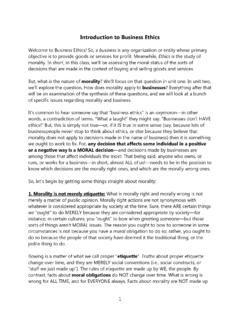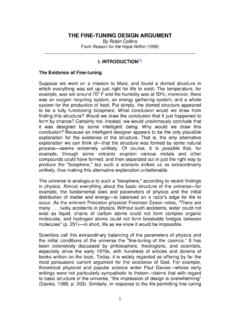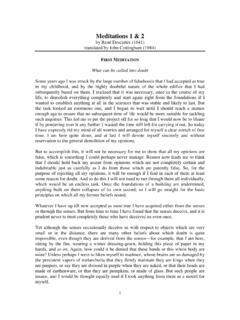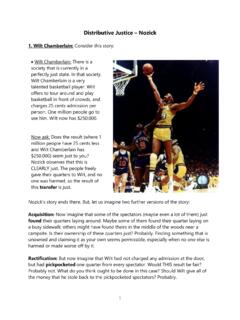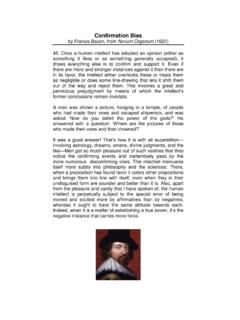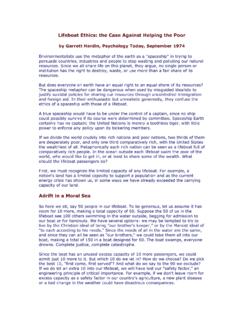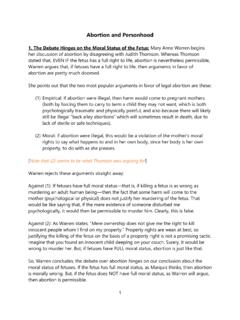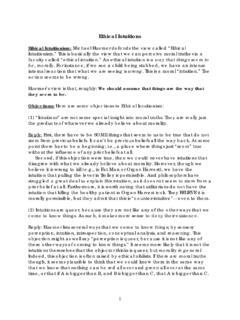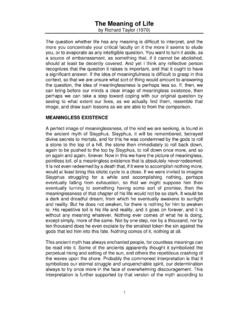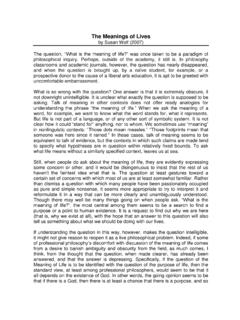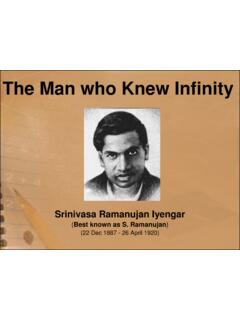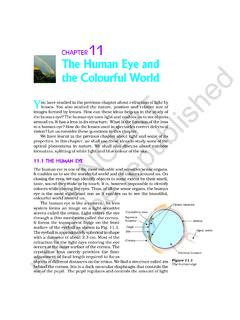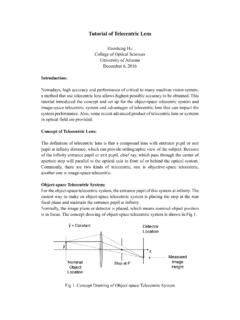Transcription of The Kalam Cosmological Argument
1 The Kalam Cosmological Argument The Cosmological Argument attempted to prove that, regardless of whether or not the universe has a finite past, it requires a cause that is outside of the universe. But, imagine that we could prove that the universe DOES have a finite past? What if the universe just popped into existence one day? Wouldn t this require an explanation? The theist argues that it does. 1. The Argument : The Kalam Argument is as follows: 1. Whatever begins to exist has a cause. 2. The universe began to exist. 3. Therefore, the universe has a cause. 2. Premise 1: Whatever Begins to Exist Has A Cause: Craig thinks that the first premise is intuitively true. Note that it is a version of PSR. But, is it true? Objection: Contemporary physics has disproved the claim that everything requires a reason, explanation, or cause.
2 Certain quantum events involving fundamental particles are completely causeless. For instance, in the double-slit experiment, scientists claim there is NO reason why the particle picks one slit rather than another when observed. In radioactive decay, scientists claim there is NO reason why a particular particle decays at a particular time. On the WHOLE, a compound will decay a certain approximate rate ( , it has a half-life), but PARTICULAR facts such as <Particle X decayed at time T> have no explanation. Finally, scientists tell us that particles can pop into existence, and in fact DO so in our own universe (for instance, near the perimeters of black holes). Reply: First, these events are only causeless on the Copenhagen interpretation of quantum physics. Others ( , those following the Bohm interpretation) are attempting to explain these events within a deterministic framework.
3 Second, note that premise 1 of THIS Argument does not make the strong claim that EVERY fact requires an explanation. Rather, it makes the much weaker claim that, only things that BEGIN TO EXIST require a cause. But, then, even if quantum physics DOES say that certain events are truly indeterministic ( , there is no sufficient reason for why a particle acts the way it does in certain circumstances), it does NOT postulate that particles can come into existence out of absolutely nothing. When you question a physicist, what most of them will REALLY say is that, at best, particles sometimes begin to exist due to certain quantum fluctuations in a near vacuum. 3. Premise 2: The Universe Began To Exist: This premise is much more controversial. Craig attempts to support it in four different ways. (1) An infinitely numbered collection of actual things is impossible: First, Craig argues that there cannot be an infinite number of anything actual.
4 But, if the past is beginningless, then it is infinite; and, if the past is infinite, then it there are an infinite number of past events. Craig argues that an infinite collection of anything actual is impossible, because (if it were possible) it would lead to a number of absurdities. To illustrate this, he uses the example of Hilbert s Hotel: Hilbert s Hotel: Imagine that there is a hotel with an infinite number of rooms. Now, imagine that ALL of the rooms are full. Every room is occupied by exactly one person. What if someone were to come along and ask if there are any vacancies? We might think that such a hotel, since it is full, would have no vacancies. But the clerk at the front desk is easily able to accommodate the new guest in the following way: The clerk has everyone exit their rooms at once.
5 She then assigns the guest from room #1 to room #2, and the guest from room #2 to room #3, and the guest from room #3 to room #4, and so on, so that every guest in the hotel moves to the next room over. Now, room #1 is vacant! With a finite number of rooms, this would be impossible. Say there are 10 rooms. The guest from room #9 goes into room #10, but where does the guest from room #10 go? That guest is left without a room, because THERE IS NO room #11. But, when the number of rooms is infinite, THERE IS NO LAST ROOM. So, no one gets cheated by the room swap. What is worse, the clerk could create an INFINITE number of vacancies in a similar way; for instance, she could assign the guest from room #1 to room #2, the guest from room #2 to room #4, the guest from room #3 to room #6, and so on, so that every guest goes to the even numbered room that is (their own room #) x 2.
6 Now, all of the odd-numbered rooms are vacant. But, there are an infinite number of those! This example tries to demonstrate that an actual infinite cannot exist, since if it did it would lead to absurdities. Clearly it is absurd to think that we could create a vacancy in a completely full hotel merely by having the guests switch rooms! (2) An infinite collection formed by successive addition is impossible: Next, Craig argues that even if an actual infinite is possible an actual infinite can never be formed by successive addition. But, if the past is infinite, that is exactly what the past must be. Craig argues that, if the past were infinite, then an infinite number of successive moments have been traversed ( , an infinite number of moments have streamed by so to speak). But, if traversing the infinite were possible, it would lead to a number of absurdities.
7 To illustrate this, he uses the example of the infinite counter: Infinite Counter: Imagine that there has ALWAYS been The Count from Sesame Street. He has always existed, and as long as he has existed, he has been counting down. Today, he is about to reach zero. Negative two! he says. Negative one! Zero!!! Ah ah ah! ( Who is the Count? you ask? Find him here.) Now, it seems clear that, if I begin counting up ( one, two, ), I will never reach infinity. One can never count TO infinity. But, why should it be any different in the other direction? How could one ever count FROM infinity? In this example, it seems like The Count would reach zero today, because (if the past is beginningless) there were an infinite number of moments before today. But, There were also an infinite number of moments before YESTERDAY.
8 So, it seems like The Count should have finished counting yesterday. But, There were also an infinite number of moments before A YEAR AGO, or A BILLION YEARS AGO. In fact, no matter how far back in time we go, it seems like The Count should have ALWAYS ALREADY FINISHED counting (since, no matter how far back in time we go, there was always an infinite amount of time before that). But, that is absurd. Therefore, an infinite succession cannot be traversed. Objection: Arguments (1) and (2) seem to rely on some sort of trickery involving infinity, much like Zeno s paradoxes (that prove that motion is impossible), which are obviously false (since things DO move, obviously). Reply: Zeno s paradoxes are not analogous to the Hilbert s Hotel and Infinite Counter paradoxes, for 3 reasons: Zeno s examples involve unequal increments, whereas Craig s involve equal increments.
9 Zeno s examples involve finite durations/distances, whereas Craig s involve infinite times durations/distances. Zeno s examples involve potential infinites (formed by successive division), whereas Craig s involve actual infinites (since, if the universe is beginningless, then it is ACTUALLY infinite) (3) The universe is expanding: The last two reasons that Craig provides are scientific rather than philosophical. Recently, astronomers have discovered that the universe is expanding. Everything is getting further away from each other. If we rewound time, we might expect to see everything getting closer and closer to each other. But, rewind far enough, and there must be some starting point; some central point where everything began to expand. This is exactly what scientists propose. At some time in the past, the universe began to expand out of a point that was infinitely small and infinitely dense.
10 That point is known as the singularity and the event when the universe began to expand is known as The Big Bang. The common interpretation of this event is that it is the beginning of all space, time, matter, and energy. The universe simply began to be. And before this event, there was nothingness. (4) The universe is running out of energy: The last point is closely connected to the previous. Scientists tell us that a closed system will always lose usable energy; , it will tend to a state of equilibrium. Candles burn out; cars run out of gas; clocks eventually stop after you wind them up. This is known as entropy. Now, there IS a finite amount of usable energy in the universe, and the universe is NOT at equilibrium right now. But, scientists predict that, in billions of years, the universe will be a cold, lifeless, and static place; nothing but a homogenous, extremely sparse gas composed of elementary particles and no change will ever occur again.
